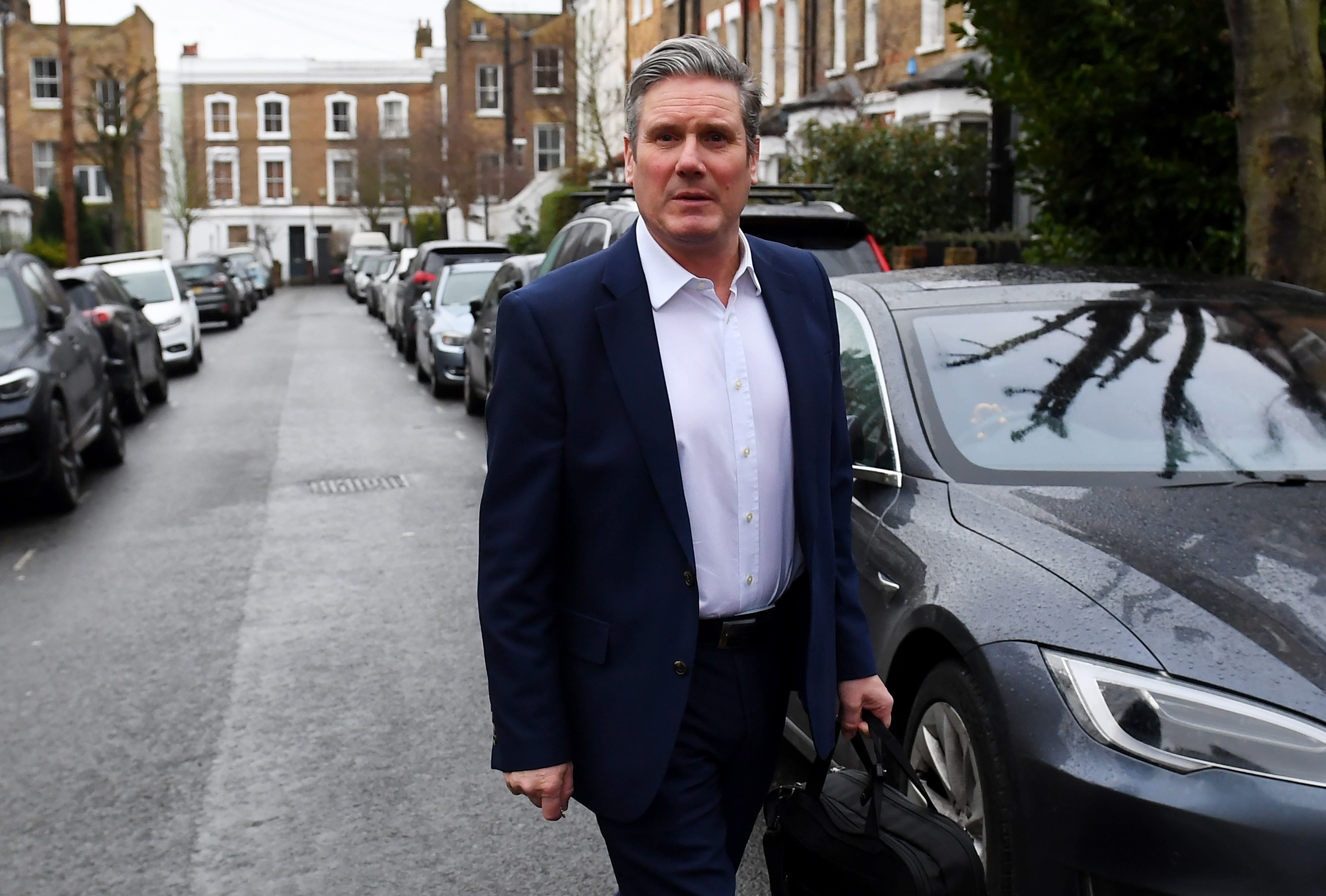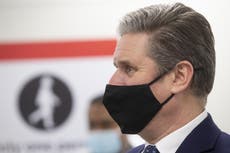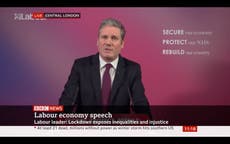What Keir Starmer said in his big speech – and what he really meant
Our chief political commentator, John Rentoul, decodes the Labour leader’s speech on economic policy


What Keir Starmer said: When I went to one of our brilliant vaccine centres a few weeks ago I saw something extraordinary. People arriving – by the dozen – with anxiety etched across their faces.
What he really meant: They looked like me: permanently worried. This does not reassure the voters, who want a big smiley Blair or a can-do Boris Johnson.
What he said: But as our brilliant NHS vaccinated them, I saw their anxiety drain away. And they left with smiles – broad smiles – on their faces. It’s that spirit of hope and optimism that I want to start with today.
What he meant: So I’m going to try to smile and relax. I might even lean casually on the lectern, and chat to the viewer in a cheerful, friendly and positive way.
What he said: I believe there’s a mood in the air which we don’t detect often in Britain. It was there in 1945, after the sacrifice of war, and it’s there again now.
What he meant: The voters of Britain aren’t often prepared to think about electing Labour governments, but I’ve got to will it to happen.
What he said: In a few weeks’ time, we’ll have a Budget that will offer a simple choice: A fork in the road.
What he meant: Caution: Cutlery in the carriageway.
What he said: We can go back to the same insecure and unequal economy that’s been so cruelly exposed by the virus, or we can seize this moment, and go forward to a future that’s going to look utterly unlike the past.
What he meant: Details to follow.
What he said: We can’t return to business as usual.
What he meant: The lockdown will last for ever. No, wait. This is the bit Ed Miliband drafted. Are we sure he meant that? Could someone check with him?
What he said: I’ve said a lot about the incompetence of the government in handling the pandemic and I make no apology for that.
What he meant: The focus groups hate it but I’ve got an impatient party to manage, so bear with.
What he said: The truth is that the Conservatives promised to fix social care for a decade, but never got round to it.
What he meant: It’s true, this, and you ought to care about it, because you might end up in a home one day.
What he said: These are the inevitable consequences of a decade of decisions guided by the notion that government can’t interfere with the market.
What he meant: Then along came Boris Johnson and Rishi Sunak and stole all Labour’s best tunes.
What he said: But I fear that the Conservatives are incapable of seizing this moment.
What he meant: I fear that the Conservatives are capable of seizing this moment.
What he said: Successive Conservative prime ministers have used the rhetoric of change: of “northern powerhouses”, “burning injustices” or “levelling up”. But all it ever adds up to is a few soundbites and the odd photo opportunity.
What he meant: The country is crying out for better soundbites and more serious photo opportunities.
What he said: The truth is, whoever their prime minister is, the Conservatives simply don’t believe that it’s the role of government to tackle inequality or insecurity.
What he meant: Whether it’s Johnson or Sunak that I face at the next election, and regardless of how different they may seem from the previous lot, I will say: “Same old Tories.” Worth a try, anyway.
What he said: They believe a good government is one that gets out of the way, rather than builds the path to a more secure future.
What he meant: Yes, it’s a rubbish line against a government that put most of the country’s workforce on the state payroll through furlough and is running one of the world’s fastest mass vaccination programmes, but it’ll all look different in three years. That’s what Gordon Brown tells me, anyway.
What he said: As the OECD, the IMF and the IFS have all indicated, the public finances must be returned to sustainability over the medium to long term, not in the short term.
What he meant: The people of this country have not had enough of experts from organisations with acronyms saying that they know what is best and getting it consistently wrong.
What he said: That’s why a Labour Budget would protect families. We wouldn’t cut the £20 uplift in universal credit, benefitting 6m families by £1,000 a year.
What he meant: Neither will Rishi Sunak, of course, but by then I will have moved on to something else.
What he said: If I were prime minister, I would introduce a new British Recovery Bond.
What he meant: I pass the credibility test. People can imagine me in No 10, announcing big, impressive-sounding policies.
What he said: This is bold, it’s innovative. And it’s an example of the active, empowering government I believe is needed if we’re to build a more secure economy.
What he meant: It’s more borrowing.
What he said: Under my leadership Labour’s priority will always be financial responsibility.
What he meant: Labour’s priority will always be to borrow more.
What he said: If we’re honest, for too long Labour has failed to realise that the only way to deliver social justice and equality is through a strong partnership with business.
What he meant: I was a loyal member of Jeremy Corbyn’s shadow cabinet. I want you to forget it ever happened.
What he said: Under my leadership, that mindset will change.
What he meant: Mr Corbyn is not currently a Labour MP.
What he said: That’s why, if I was prime minister, I’d back a new generation of British entrepreneurs.
What he meant: New Labour, New Britain.
What he said: People often ask me why I want this job. The answer is simple: To change people’s lives. It’s why I’m so proud to lead the party I love. And why I want to lead the country I love.
What he meant: Serious, patriotic person for serious, patriotic times. None of your mumbling the national anthem here.
What he said: Inequality is not only morally bankrupt, it’s economic stupidity too.
What he meant: It was kind of Ed Miliband to let me have this line from one of his unused 2013 speeches.
What he said: Harold Wilson once said that the Labour party is a moral crusade or it is nothing. He was right.
What he meant: I need to pray in aid a Labour leader who won elections. Can anyone think of one?




Join our commenting forum
Join thought-provoking conversations, follow other Independent readers and see their replies
Comments